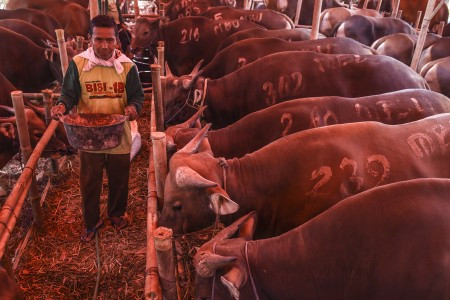Popular Reads
Top Results
Can't find what you're looking for?
View all search resultsPopular Reads
Top Results
Can't find what you're looking for?
View all search resultsIdul Adha to fall on July 31, government declares
The Religious Affairs Ministry has banned the public celebration of Idul Adha in red zones or areas with high transmission of COVID-19.
Change text size
Gift Premium Articles
to Anyone
The government announced on Tuesday that Idul Adha (Day of Sacrifice) would fall on July 31.
Religious Affairs Minister Fachrul Razi made the announcement after holding a limited isbat (confirmation) meeting at the ministerial office in Central Jakarta on Tuesday.
He explained that in declaring the date of Idul Adha, the ministry and several Islamic organizations had taken into account hisab (astronomical calculations) and rukyat (lunar movement observations).
The minister also said that 12 out of 84 observation locations across Indonesia had spotted the hilal (crescent moon), thereby marking the first day of the month of Zulhijah.
“Based on the hisab, the position of the hilal is on the horizon. Meanwhile, based on rukyat, the hilal has also been spotted. By consensus, it has been decided that the first day of Zulhijah falls on Wednesday,” Fachrul said.
“[Thus], Idul Adha will fall on the 10th day of Zulhijah, Friday, July 31,” he added.
Observance of the holy day includes congregational prayers in the morning, followed by the slaughtering of sacrificial animals, the meat from which is distributed to the poor.
Nevertheless, based on Circular No.18/2020 issued on June 30, the Religious Affairs Ministry has banned the public celebration of Idul Adha in red zones or areas with high transmission of COVID-19.
People who wish to participate in congregational prayers are required to wear masks and bring their own prayer mats. However, children and the elderly are prohibited from participating, as they are considered at high-risk of contracting the virus.
Meanwhile, the qurban (sacrifice) processions require butchers to refrain from touching their faces and everyone included in the process must adhere to health protocols.
Indonesia’s second-largest Muslim group, Muhammadiyah, has also called on its followers to not to hold public congregational prayers. Instead, they have been advised to conduct Idul Adha prayers at home with their families or a small congregation in their neighborhood to prevent further transmission of COVID-19. (trn)










